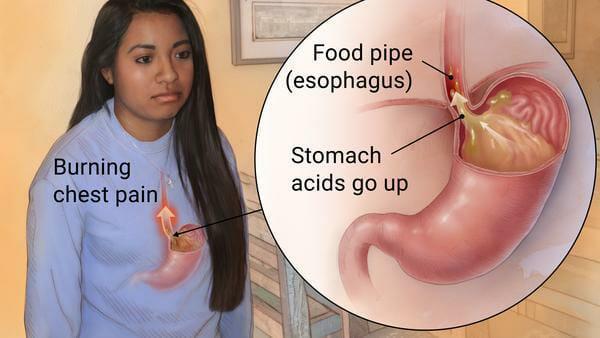Acid Reflux & GERD
What is reflux and how is it caused?
Reflux (also called Gastroesophageal Reflux Disease or GERD) is caused by a weak muscle in your esophagus called the Lower Esophageal Sphincter (LES) that allows acid and bile to flow back from the stomach into the esophagus, causing damage to the lining of the esophagus, throat and lungs.

Request Appointment
Contents
What are the symptoms?
Heartburn is the most common symptom of GERD but not the only one.
- Dental erosion and bad breath
- Change in voice
- Cough
- Hoarseness
- Sore throat
- Asthma
- Shortness of breath
- Heartburn
- Dysphagia (difficulty swallowing)
- Chest pain
- Regurgitation
How is acid reflux treated?
In most cases, a combination of medications and lifestyle changes resolves acid reflux very effectively. Avoiding the unhealthy habits that trigger acid reflux is important, and the AMI Surgery team can help you with weight loss treatments.
How are acid reflux medications?
Medications include antacids, which help neutralize the acid in your stomach, and drugs such as proton pump inhibitors that affect acid production.
If you continue to experience acid reflux despite following a conservative treatment program, you might need surgery. AMI Surgery performs expert procedures, including same-day surgeries that conform to the highest safety standards. The practice also accepts most insurance plans.
What surgery might I need for acid reflux?
The standard surgery for acid reflux is Nissen fundoplication. It involves wrapping the top of your stomach around your esophagus to support the LES.
One option for performing Nissen fundoplication is minimally invasive laparoscopic surgery, which avoids the large incisions necessary in open surgery. Benefits of a laparoscopic approach include less pain and discomfort, a quick recovery, and minimal to no scarring.
What alternative treatments are available for acid reflux?
AMI Surgery also offers incisionless surgery for acid reflux for suitable patients. Transoral incisionless fundoplication (TIF) uses advanced endoscopic techniques.
An endoscope is a flexible instrument that fits down your throat. It has a camera that relays images of the inside of your body to a monitor in the operating room.
Your provider at AMI Surgery passes the endoscope through a TIF device that enables them to repair or recreate the LES using surgical tweezers and fasteners.
If persistent acid reflux affects your quality of life, find out whether TIF or another treatment could relieve your symptoms. Talk to AMI Surgery’s bilingual surgeons and staff by calling the office nearest you, or book an appointment online today.
What is the difference between GERD and acid reflux?
Acid reflux is a common problem that doesn’t last long and is easily relieved with antacids. GERD is a more severe form of acid reflux.
If your reflux returns despite taking antacids or you have acid reflux several times a week, chances are you have GERD.
How is GERD treated?
Treatment for GERD usually begins with lifestyle changes and medications. For example, you may need to lose weight, avoid foods that trigger your reflux, and eat small meals.
The team at AMI Surgery may prescribe an antacid or proton-pump inhibitor that’s stronger than over-the-counter medications.
If your GERD doesn’t improve, you may need to consider getting the LINX® Reflux Management System to strengthen your LES.
How does LINX work to treat GERD?
LINX is a small, flexible ring of small magnets. Using laparoscopic surgery, your provider places the ring around the outside of your esophagus at the LES.
The magnets keep the LES closed until you swallow, when LINX temporarily opens to let food and liquids into the stomach.
LINX has an exceptional record of success, with 88% of patients reporting that they are still heartburn free five years after getting the device.
If you need relief from GERD, call AMI Surgery or schedule an appointment online today.
Request Appointment
LEARN MORE ABOUT OUR SERVICES
Acid Reflux
more info
Aesthetic Treatments
more info
more info
more info
Gastric Banding
more info
Gastric Bypass
more info
Gastric Sleeve
more info
General Surgery
more info
GERD
more info
more info
more info
Laparoscopic Surgery
more info
more info
more info
more info
more info
Sclerotherapy
more info
more info
Varicose Veins
more info
more info
OUR LOCATION